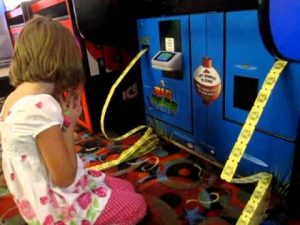
While there’s lots of written theory about gamification, and there’s some really interesting case studies available for review, nothing beats getting a hands-on education. And what better place than a modern video games arcade where tickets can be won and exchanged for prizes?
Over summer break my kids and I invested valuable hours at Happydays, located at Broadway shopping centre in Sydney, to learn everything we can about the approach this relatively old industry is taking to drive deeper customer engagement and repeat visits.
While the arcade is packed with lots of modern digital games which primarily involve wholesale slaughter of zombies, skeletons, ghosts, dinosaurs, wild animals and terrorists, there is another completely different games approach which closely parallels a points-based rewards program.
Around 50 per cent of the games allow players to earn prize tickets. The higher the score, the more tickets earned. Most of the games which allow for the earning of tickets are family-friendly, and include shooting hoops, hitting targets, knocking down dummies, catching digital fish, bonking Minions on the head and spinning wheels.
The effect winning tickets has on players should be of interest to serious scholars of loyalty psychology. The tickets are brightly coloured and shaped like an old-school bus ticket, which means if more than a few of them are won, one is led to feel they have amassed significant value. The tickets pump out from the machine like a long, slow snake, and if enough are won they can extend all the way down on the floor and start to pile. My kids in particularly became really excited every time tickets spewed from the machine. After a few games, we were carrying around a small pile and wondering how much they were worth.
And the answer is, not much. By our rudimentary calculations the most value players can receive per ticket is 1 cent, and it can be as little as 0.2 cents for smaller, lower value items. Players are tantalised with a sizeable range of attractive rewards, primarily targeted at children, however very few can actually be accessed with their wheelbarrow-load of hard-won tickets due to the enormous number required. Surprisingly, they were more than happy to redeem their tickets for a small stretchy alien each.
Rumour has it a video arcade in Korea replaced paper tickets with digital tickets in an effort to reduce operating costs, only to see a significant drop-off in revenue. Apparently players weren’t as inspired to play games when the physical tickets weren’t pumping out all over the ground. An interesting insight, indeed.
Philip Shelper is a loyalty management consultant based in Sydney, Australia who obsesses about everything to do with loyalty and rewards. His company Loyalty & Reward Co are a leading loyalty consulting firm.
Phil is the author of Blockchain Loyalty: Disrupting loyalty and reinventing marketing using cryptocurrencies. Buy the book.
www.blockchainloyalty.io is a global resource centre for everything blockchain loyalty.
Let’s connect!
LinkedIn: https://au.linkedin.com/in/philipshelper
